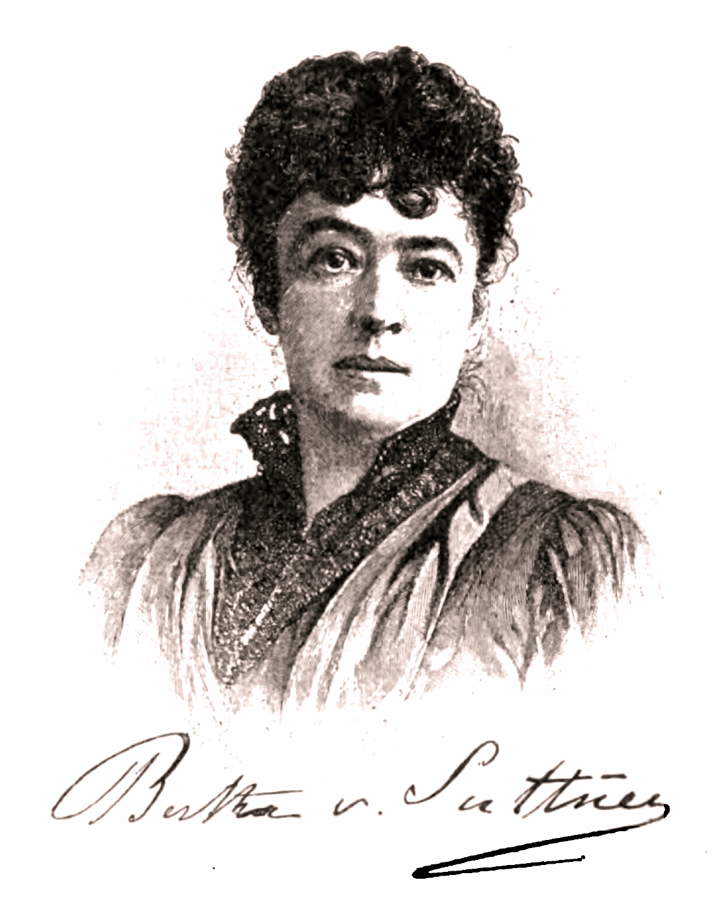Hélène Serres
Her life
Among the great men who campaigned for peace…, a human and humanist figure, a woman named Bertha von Suttner, born Sophie Felicitas, Countess Kinský von Chinic und Tettau. She is a great pacifist (she is the one who invents the word), but also a visionary, and a pioneer. On December 10, 1905, Bertha Von Suttner was the first woman to win the Nobel Peace Prize, established in 1901.

She was born in Prague on June 9, 1843, in an aristocratic family from Austria- Hungary. She will not know her father, Franz Michael Graf Kinsky, who dies before she is born. It is his mother, Sophie Wilhelmine, who will give her a particularly good education.
She will learn several languages (German, English, French and Italian) ; she will be trained in literature, science, and initiated to philosophy. She will travel a lot.
She comes from a family of soldiers, generals. She attends in her youth the horrors of the war, in 1866, in the vicinity of the castle of her ancestors, in Bohemia.
Her mother squanders their fortune. At 30, she became a governess in the family of a wealthy Viennese industrialist, Baron Karl von Suttner. She meets the son of the family who welcomes her, Baron Arthur Von Suttner, seven years younger than her. They fall in love with each other. They see each other in a discreet way. Unfortunately, the family who will know this, was against this liaison.
Bertha had to give up her job and accepted, in 1876, a post as secretary in Paris, working with Alfred Nobel, inventor of dynamite, producer of weapons at the forefront of technology, but convinced pacifist. She will remain at his service when he resides in Paris. Although this period was very short, she will remain a great friend of Nobel, with whom she continued to correspond until the death of the scientist in 1896. This meeting was decisive for him, because Bertha Von Suttner will encourage him to put his fortune in the service of a humanist foundation, which will be at the origin of the Nobel Prizes. He affectionately calls her “the Amazon who makes war on war”, a formula taken up a few years later by Jean Jaurès.
She returned to Vienna and eventually married on June 12, 1876, with Arthur Von Suttner, but in secret, because the family was shocked at Bertha’s freedom of spirit. He will be disinherited by his family.
The young couple will then take refuge in Georgia, with the princess Ekatarina Dadiani von Mingrelien where it will remain 9 years. They discover a talent for writing; they live from translations or writing popular novels.
With the Russo-Turkish War, Arthur publishes war stories in German newspapers, while Bertha works as a journalist; under the pseudonym of B. Oulet, she writes short stories and essays for Austrian newspapers.
In 1885, they returned to Vienna and reconciled with the von Suttner family: they moved to the family estate.
Continuing to write, Bertha explores the theme of pacifism, confident in the ability of man to improve and no longer resort to war. She publishes essays and novels pacifists. A novel, published in 1889, will make it famous: « Die Waffen nieder »! (« Down arms »!), in which she describes the war from the point of view of a woman. The novel is very successful – it will be translated into 12 languages and adapted to the cinema.
Leo Tolstoï declared in 1889, after having it: “The abolition of slavery came from the Case of Uncle Tom of Elisabeth Harriet Beecher Stowe. The abolition of war will come from the work of Bertha von Suttner ».
On December 10, 1902, Artur Gundaccar von Suttner died in Harmannsdorf at the age of 52, after having married his wife’s thesis.
In debt, Bertha sells their property and moves to Vienna where she continues to write.
In June 1904, Bertha attended the International Women’s Conference in Berlin.
She travels from country to country, especially in the United States where she is invited to the White House to talk to President Theodore Roosevelt.
On December 10, 1905, Bertha Von Suttner was the first woman to win the Nobel Peace Prize, established in 1901.
She died of cancer June 21, 1914, a few weeks before the start of the First World War which she had warned of risks.
Her fight for peace
Bertha will campaign, very early for peace, in the name of universal values.
It will defend human rights, and advocate for women’s rights. Defender of secularism, the Austrian will be a pioneer in the fight against the death penalty, racism, anti-semitism, and colonialism.
The pacifism of the baroness, at first moral, rests on a true humanism and the belief in human progress.
She will become one of the main representatives of the pacifist movement, and the inescapable reference of all “friends of peace”. His ideas will impact the consciences of peoples and leaders.
In 1890-91, Bertha created a “Venice Society of Peace” (Friedensgesellschaft Venedig), and an Austrian pacifist society, the Österreichische Gesellschaft der Friedensfreunde, of which she was appointed President – a position she held until her death.
In 1891, she will deliver her first public address in Italian at the 3rd International Peace Congress. In November 1891, at the World Congress for Peace in Rome, she was elected Vice- President of the International Peace Bureau and founded the Deutsche Friedensgesellschaft (German Peace Society), which brings together.
She is going to be at the origin of the Federation of the national organizations, in the International Union of Peace sitting in Bern, of which she naturally becomes the Vice-President, at a time when the women are not accepted in the instances. It promotes pacifist journals, and challenges politicians and diplomats from all countries on the issue of peace.
She promotes pacifist journals, and challenges politicians and diplomats from all countries on the issue of peace.
Bertha attends several international peace conventions. In 1899, she took part in the preparation of the first conference in The Hague. She will be known for her speeches and analyzes of Russia in the United States.
She denounces racism, nationalism, anti-semitism and fanaticism in all its forms.
She also denounces arms manufacturers, terrorism, and the rise of armaments of the great powers.
She is convinced that war cannot be effectively combated without attacking its root causes, economic exploitation, political oppression and all forms of injustice.
She will campaign for disarmament, and denounce the German Emperor, William II.
She calls for the creation of an international arbitration Court to settle disputes between nations legally.
She challenges politicians. Bertha von Suttner discusses on an equal footing with everyone, including the greatest of the world: the belligerent Emperor Wilhelm II of Germany, that of Austria-Hungary Francis Joseph I, Tsar Nicholas II and President of the United States Theodore Roosevelt.
In France, as Francophone and Francophile, she maintains excellent relations with, besides Jean Jaurès, some writers like Emile Zola, Anatole France, Romain Rolland. It is her who allows him to get closer to socialist values. She is sometimes also called the red baroness. Nevertheless, in order to preserve her freedom of speech, she never adheres to any party.
If she first seeks to win the elite, the baroness does not give up convincing the masses. It will long believe, underestimating the power of nationalism, that people aspire to peace and that only the rulers desire war.
She does not hide her concern about modern civilization, which she claims is bringing new barbarities. Stefan Sweig nicknamed her in 1904 the Cassandra of our time.
She will die one week before the bombing of Sarajevo and the outbreak of the First World War, after dedicating her life to the search for understanding between peoples.
She will remain the symbol of pacifist action.
